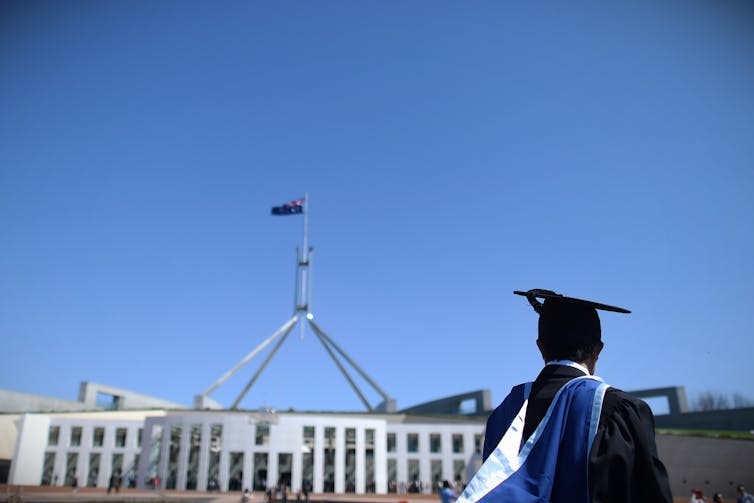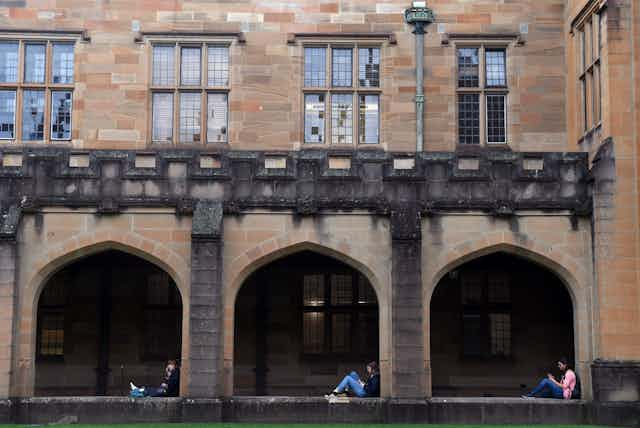Australian universities are calling on the federal government to uncap university places for all Indigenous students.
This would mean any Indigenous applicant, provided they met the entrance requirements, could go to university. Currently, places are only uncapped for Indigenous Australians living in regional and remote areas.
The proposal is part of a broader push by peak body Universities Australia to increase Indigenous participation in higher education.
Is it a good idea? What is needed to boost Indigenous participation at university?
Australian universities and Indigenous students
On Sunday night, Universities Australia released a progress report on their Indigenous Strategy.
This explicitly recognises the presence and impact of racism in Australian universities. And emphasises universities’ responsibility for Indigenous advancement, addressing racism and cultural safety and embedding Indigenous knowledge and perspectives into university systems and structures.
It shows how universities are still heavily focused on recruitment of Indigenous students. These strategies are working at some level. The report noted Indigenous student enrolments more than doubled between 2008 and 2021.
But Indigenous student enrolment is still only at 2.08% and bachelor degree completion rates remain low compared to non-Indigenous students.
Almost one in two Australians in their 20s have a university degree compared to only 7% cent of young Indigenous Australians.
Uncapped places
Universities Australia wants to see a new push to improve Indigenous participation through uncapped places for all Indigenous Australians, irrespective of their postcode.
With 75% of Indigenous people living in urban areas, Universities Australia say the current policy needs to change.
The call comes as a time when big changes are expected for higher education. The Universities Accord review team has prepared a draft report on reshaping Australian universities. Increasing participation and access to university for disadvantaged group is a key priority. The government is expected to release it later this month.
Is this a good idea?
This proposal certainly provides a tangible pathway for any Indigenous person wishing to undertake university study, regardless of their location.
However, as with many policies affecting Indigenous peoples, it need to be part of a holistic approach. Encouraging more Indigenous Australians to enrol in a university degree will not be as simple as just uncapping places.
For any university student to be successful, they must have foundational academic skills to support their learning. Closing the Gap data in education shows there is also still a long way to go in addressing schooling educational outcomes. For example, in 2021, 68% of Aboriginal and Torres Strait Islander peoples had achieved Year 12 or higher, compared with 91% of non-Indigenous Australians.
It is vital Indigenous peoples wanting to undertake university study come equipped with the skills they need for success. Many mob come with invaluable knowledge, perspectives and experiences connected to their identities as Aboriginal and/or Torres Strait Islander peoples. In addition to these strengths, academic preparedness for university study that results from quality schooling will support their educational trajectories over the long term.

Culture must change
Indigenous students also need to be supported when they get to university. The Universities Australia report showed almost all Australian universities have activities or programs for recruitment of Indigenous students.
Although, when surveyed, less than half of the 39 Australian universities made reference to an anti-racism statement or policy. The report also notes:
member universities’ responses were generally not focused on equipping students with an awareness of Indigenous values and knowledges.
Along with more evidence-based interventions to support schooling outcomes (so students can take advantage of an uncapped place), universities must embrace the challenges outlined in the report and take real action to address them.
If the culture and environment of universities don’t change, providing more numbers or even other methods such as scholarships are unlikely to change the overall outcome.
Urgent action is required and uncapping Indigenous student numbers is only one small part of a larger picture.

